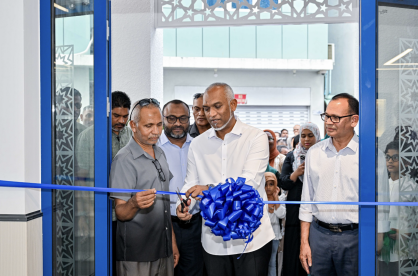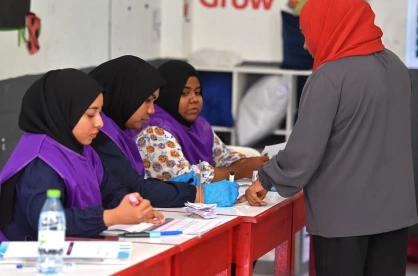The cost of democracy
Over MVR100 billion has been spent on recurrent expenditures alone since 2004.

The President's Office - MFR Images
Over MVR100 billion has been spent on recurrent expenditures alone since 2004.

The President's Office - MFR Images
Since 2004, the Maldives started her journey to move towards a modern democracy and this was cemented with the enactment of the new constitution in 2008 by President Maumoon Abdul Gayoom. It paved way for full separation of powers, as well as the creation of independent institutions to monitor the three branches of power and safeguard human rights.
Within the same year, the Maldives held her first multi-party presidential election which was won by Mohamed Nasheed; currently the Speaker of Parliament. In order to strengthen the democratic process, many independent institutions were formed with the public sector being expanded by each government — leading one to perhaps wonder how much has the state spent on the nation’s still fledgling democracy.
During the last 16 years, the government budget increased by a staggering eightfold from MVR4 billion, in 2004, to MVR29 billion. Compared to 2004 levels, almost 64 percent of the cumulative increase of MVR220 billion accounts for the expansion in the recurrent expenditures which increased from MVR3 billion to MVR19 billion between 2004 - 2020 while cumulatively it increased by MVR140 billion. Similarly, during the same period, and capital and Public Sector Infrastructure Projects (PSIP) increased 10 fold, from MVR900 million to over MVR10 billion due to increase in public demand for infrastructure projects.

With regard to components of recurrent expenditures, on average almost 70 percent of the expenditure was spent on wages, allowances and other administrative expenses. As such, from 2004 - 2020, the government spent over MVR100 billion cumulatively on such administrative expenditures. The largest expenditure hike was on the salaries, allowances and benefits which increased from MVR1 billion to MVR9 billion and a majority of the expenditure increase was due to the formation of independent institutions with ever increasing wages — with little or nothing to show for it in terms of public gains. A significant increase was seen in the benefits and gratuities as it expanded by more than 10 fold largely as expenditure pensions and retirement benefits increased. Similarly, with the expansion of the public sector, transportation, communication and utilities expenditures also increased rapidly from MVR500 million in 2004 to almost MVR2 billion by 2020.
The two institutions with the biggest recurrent budgets are the Judiciary and the Parliament. The total budget of Judiciary in 2005 was about MVR70 million but by 2020 it has increased sixfold to over MVR430 million largely driven by increase in salaries and allowances. Similarly, the Parliament budgets also exploded, increasing fivefold from MVR27 million in 2005 to MVR153 million as the wage bill of the members were increased drastically.

Similar hike is also seen in the budget of independent institutions and some of the most significant institutions includes the Maldives Inland Revenue Authority (MIRA), the Anti-Corruption Commission (ACC), the Human Rights Commission (HRC), the Auditor General’s Office (AGO) and the Prosecutor General’s Office (PG). The total budget for these institutions increase threefold from about MVR80 million in 2009 to over MVR250 million by 2020. The largest increase in budget was seen in MIRA as it increased from MVR7 million in 2009 to over MVR90 million in 2020. Likewise, HRC’s budget was increased from MVR1 million in 2005 to MVR23 million in 2020 while ACC’s budget increased by 12 fold from MVR3 million to MVR37 million during the same period.

Since 2005, there has been a huge spike in the formation of independent institutions and according to a report published by the National Pay Commission (NPC), by 2017 there were 30 such institutions. In 2020, inclusive of the Parliament, Judiciary and other independent institutions, the government was spending about 4 - 5 percent of the total budget (or over MVR1 billion) on such institutions. As per the 2021 budget, there are over 43,000 staff in the public sector and the total wage bill for all the independent institutions, with over 4,000 staff, is about MVR780 million which is nine percent of the total wage bill, while political or appointed positions accounted for seven percent of the wage bill with the largest portion accounted for by the 23,000 strong civil service.
However, there is a huge disparity between salaries and other allowances paid to the civil service and independent institutions, and even political & appointed positions. Based on the 2021 budget, the salaries and allowances on average per month for a civil servant amount to MVR13,000 while those in independent institutions would receive, on average, about MVR16,000 — with uniform-bodies receiving a higher average salary still at MVR19,000. The largest salary and allowances on average is earned by political appointees which is around MVR36,000 for the 1,250 such positions. As per the NPC paper, even among similar position there is a huge wage disparity among civil service and independent institutions. As per their study based on 2017 data, even so far as basic pay, there can be a 44 percent pay gap in semi-executive jobs with a 17 percent gap in administrative jobs while the support staff and managerial jobs can see a 5-6 percent difference in pay.
The increase in budget is justified if the institutions are able to function independently to carry out the responsibilities assigned to them and if there are significant improvements in productivity. But more often than not, save for a few institutions such as MIRA, the public find most of independent institutions lacing in any tangible output or improvement of their work. The two institutions that see the most public outcry, when it comes to output and productivity, is that of the Judiciary and the ACC — as, very often, they are seen as highly politicised in the execution of their duties.
Before 2004, the budget had been well managed and was largely matched with the revenues of the government and the deficit was kept under control, and public debt kept below 40 percent of GDP. However, since 2005 the budget expenditure was increased from 38 percent of GDP to 48 percent of GDP while revenue as a percentage of GDP has declined from 30 percent of GDP to 26 percent of GDP. This has resulted in huge consecutive budget deficits and significantly increased the total national debt. The total debt has increased from 43 percent of GDP in 2005 to 143 percent in 2020.

In order to control the deficit and debt, government could expand the government revenues further, meaning higher taxes and fees from the private sector and public. Conversely, government could reduce the recurrent expenditures or delay some PSIP projects. One major recommendation by the NPC has been to place a ceiling on the wage bill of the public sector since the government’s wage bill is seen as unsustainable — with the trajectory increasing ever higher compared to international acceptable standards.
According to the IMF the wage bill and compensation standard for upper middle-income economies such as Maldives in terms of internationally acceptable and sustainable levels of wage bill to GDP ratio is seven percent while the wage bill to revenue ratio must be within 30 - 40 percent — and wage bill to recurrent expenditure ratio should not exceed 40 percent. However, the Maldives has breached most of these ratios with wage bill to GDP increasing from 14 percent in 2008 to 16 percent of GDP in 2020. Although, the wage bill to revenue ratio is around an acceptable level at 38 percent, the wage bill to recurrent expenditure is at 47 percent and well above the acceptable range.
Putting a cap on the recurrent expenditures, especially on the wage bill, is harder to implement due to the political sensitivity of such a policy especially when government has promised to increase salaries further and to start the harmonisation process of wages. Hence, the government needs to find other ways to cut expenditure especially by cutting down on administrative cost and other wasteful spending since, if not controlled, the debt distress is a real possibility — as seen from the recent downgrading of the Maldives’ sovereign ratings. If that happens, the benefits of the democratisation process may start to unwind as the government may be forced to reduce the size of the public sector and the functioning of independent institutions may be further hampered.



